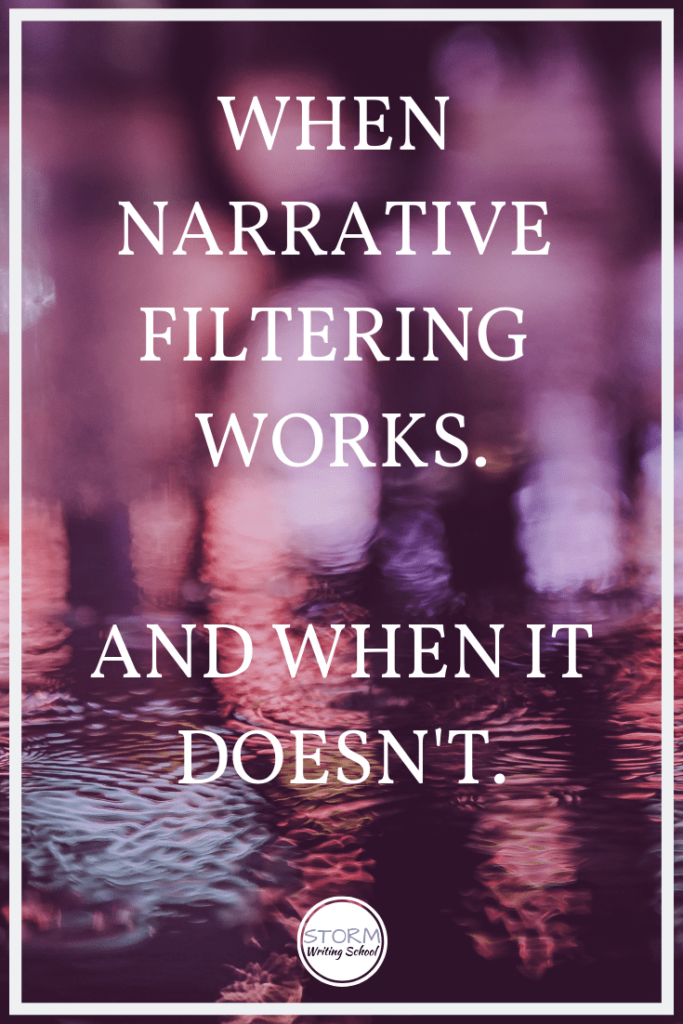What is filtering?
What does “filtering” mean in prose storytelling? It’s when the events represented on the page are filtered through the perceptual apparatus of a character in the story. That is, instead of writing, “Footsteps echoed through the hall,” the writer opts for filtering the action through a character: “Jane heard footsteps echo through the hall.”
The term “filtering” was promulgated by two big hitters in the writing craft world: Janet Burroway (Writing Fiction), and John Gardner (The Art of Fiction). I think Burroway named it.

What I’ll cover in this lesson:
- The tipoffs for filtering
- The rationale for avoiding it
- The relation between avoiding filtering and writing close narration (aka deep POV or free indirect style)
- Three situations in which filtering works:
- Analytical or explanatory narration styles
- Realizations (common in turning points)
- When gaining tension through character perception
- Conclusion: Filtering is justifiable, but you should be deliberate and selective with it
What are the tipoffs?
The typical tipoff for filtering is a sense verb: see, hear, watch, look, feel, smell, taste, notice, etc. This batch of verbs constitute what Emma Darwin labels “physical filter words”—words that suggest a physical act of sensing or perceiving.
But there are also “thinking filter words,” like wonder, realize, seem, think, remember, recall, decide, etc.
Why avoid filtering?
As Beth Hill at The Editor’s Blog points out, “reporting what a character sees, hears, feels, and watches can keep readers at a distance.”
And Janet Burroway’s original rationale for avoiding filter words was that “when you step back and ask the readers to observe the observer—to look at rather than through the character—you start to tell-not-show, and rip us briefly out of the scene.”
I’m not sure I fully agree that filtering rips us out of the scene, but it does accrue to create some distance, to reduce the immediacy of the experience. Our reading thus becomes more about observing the character than about vicariously experiencing what the characters are experiencing.
Take a look at this comparison of two passages, created by Emma Darwin, whose post on filtering is really the best out there. (The bolding of the filter words is mine.)
Tony walked over to the sofa by the wall and sat crossly on it. He looked through the door and there, in the hall, he saw Jane’s roller skates, lying yet again at the foot of the stairs. It seemed to him, though, that something was wrong with them. He noticed that one was standing straight but the other was at an odd angle, and then he saw that it was missing both its back wheels.
Tony walked over to the sofa by the wall and sat crossly on it. Through the door, in the hall, Jane’s roller skates were lying yet again at the foot of the stairs. But something was wrong with them. One was standing straight but the other was at an odd angle, missing both its back wheels.
There’s no doubt that the passage on the right (the second passage, for those on a small screen) is more immersive, that it creates a more direct vicarious experience for the reader.
The role of psychic distance
This whole topic of avoiding filtering really has a lot to do with psychic distance. When we narrate closer to the character’s subjective view of the world, we’ll usually end up with more immersive, tighter prose—especially when narrating scenes (in which action takes place).
Compare, for instance, the sentence “It seemed to him, though, that something was wrong with them” with “But something was wrong with them.” In the first sentence, the narrator is outside of the character; in the second, the narration moves right into the head space of the character. It’s the difference between puppetry and stepping into a full-body costume.
Look at my post on the Spectrum of Psychic Distance for more information on the varying distances of narration from the character’s experience.
When does filtering work?
The thing about filtering is it’s not bad in all circumstances (there’s very little in writing that is bad in all circumstances). Filtering tends to drag down action scenes (and I don’t just mean high-octane action; I mean scenes in which people do things). But your storytelling will sometimes have contemplative moments, realizations, moments of interior monologue or reaction, turning points—all sorts of situations in which filtering is appropriate.
So let’s look more closely at where filtering works.
Analysis/Explanation
Some stories take on a narration style that incorporates a lot of analysis and explanation. First-person retrospective narration (in which the narrator is looking back with gained wisdom at some earlier portion of their life) tends toward such a style. Whether in fiction or nonfiction, first-person retrospective can often have an essay-like feel.
Take this passage from Andre Aciman’s Call Me by Your Name:
What never crossed my mind was that someone else who lived under our roof, who played cards with my mother, ate breakfast and supper at our table, recited the Hebrew blessing on Fridays for the sheer fun of it, slept in one of our beds, used our towels, shared our friends, watched TV with us on rainy days when we sat in the living room with a blanket around us because it got cold and we felt so snug being all together as we listened to the rain patter against the windows—that someone else in my immediate world might like what I liked, want what I wanted, be who I was. It would never have entered my mind because I was still under the illusion that, barring what I’d read in books, inferred from rumors, and overheard in bawdy talk all over, no one my age had ever wanted to be both man and woman—with men and women. I had wanted other men my age before and had slept with women. But before he’d stepped out of the cab and walked into our home, it would never have seemed remotely possible that someone so thoroughly okay with himself might want me to share his body as much as I ached to yield up mine.
See what I mean there? Lots of filter verbs as this narrator looks back.
But omniscient third-person narrators can also take on a very analytic, explanatory style. Here’s a passage from Richard Flanagan’s The Narrow Road to the Deep North:
Through the decades following the war he felt his spirit sleeping, and though he tried hard to rouse it with the shocks and dangers of consecutive and sometimes concurrent adulteries, outbursts, and acts of pointless compassion and reckless surgery it did no good. It slumbered on. He admired reality, as a doctor, he preached it and tried to practise it. In truth, he doubted its existence. To have been part of a Pharaonic slave system that had at its apex a divine sun king led him to understand unreality as the greatest force in life. And his life was now, he felt, one monumental unreality, in which everything that did not matter—professional ambitions, the private pursuit of status, the colour of wallpaper, the size of an office or the matter of a dedicated car parking space—was vested with the greatest significance, and everything that did matter—pleasure, joy, friendship, love—was deemed somehow peripheral. It made for dullness mostly and weirdness generally.
In both of the above passages, you’ll see a lot of filter words (things crossing and entering minds, seeming, wanting, trying, feeling, doubting, etc.), but the focus is on some complicated psychology that warrants the explanation.
(I should add that these sorts of passages don’t excerpt well. Ripped from context, they might feel boring. But in context, they work quite well.)
Realization/Contemplation
At times in your story, the scene will turn on a character’s realization. Such turning points are not uncommon in Madeline Miller’s Circe (in fact, see my previous article on the blog here about The Key to Epiphanies, Realizations, and Moments of Clarity, which uses a passage from Circe as an example).
Here’s one such small turning point in a pretty small scene. It occurs once Circe is alone on an island, isolated at long last from her (pretty terrible) family and the home she has grown up in.
It was the forest that drew my eye. It was old growth, gnarled with oaks and linden and olive groves, shot through with spearing cypress. That’s where the green scent came from, drifting up the grassy hillside. The trees shook themselves thickly in the sea-winds, and birds darted through the shadows. Even now I can remember the wonder I felt. All my life had been spent in the same dim halls, or walking the same stunted shore with its threadbare woods. I was not prepared for such profusion and I felt the sudden urge to throw myself in, like a frog into a pond.
It’s the second half of that passage that gives us the filtering: remember, felt, was not prepared, felt. The first half provides the stimulus; the second half is Circe’s internal reaction to the stimulus. The stimulus itself does not have much filtering; Miller lays off the physical filter words. But the second half needs the filtering because the focus is on her mental processing of the stimulus.
Beth Hill at The Editor’s Blog writes, “When the sensing is more important than what is sensed, reporting that a character sees, hears, or feels something works well. When the event or emotion is—or should be—the focus, then you don’t want to diffuse the moment with words that report.”
I’d add that when the thinking (in addition to the sensing) takes center stage, you may be justified in using more filters.
But you should first see if it’s possible to cast the thought in close narration (aka deep POV or free indirect style). In the next paragraph in Miller’s story, she writes this:
I hesitated. I was no wood-nymph. I did not have the knack of feeling my way over roots, walking through brambles untouched. I could not guess what those shadows might conceal. What if there were sinkholes within? What if they were bears or lions?
See how she goes straight to the deep-POV questions in the end there? She doesn’t write, “I wondered if there were sinkholes within. I feared bears and lions might attack.” But in the first passage above, the line “Even now I can remember the wonder I felt” would be impossible to recast in deep POV/free indirect style.
The bottom line: if you can write close narration (deep POV), then go for it. But sometimes, you just have to filter in these situations.
Tension through Interiority
Lastly, I want to bring up one last technique that relies on filtering. This one originates (for me) from Michael Byers, who points out in his wonderful “Faking Shapely Fiction” the trick of using character perception to gain tension.
Byers draws from the great short story queen, Alice Munro, whose story “The Beggar Maid,” situates Rose about to attend a meeting with other scholarship students. Upon arriving at the room, Rose hesitates outside the door:
There was a little window in the door. They could look through at the other scholarship winners already assembled and waiting. It seemed to Rose that she saw four or five girls of the same stooped and matronly type as the girl who was beside her, and several bright-eyed, self-satisfied babyish-looking boys. It seemed to be the rule that girl scholarship winners looked about forty and boys about twelve. It was not possible, of course, that they all looked like this. It was not possible that in one glance through the windows of the door Rose could detect traces of eczema, stained underarms, dandruff, moldy deposits on the teeth and crusty flakes in the corners of the eyes. That was only what she thought. But there was a pall over them, she was not mistaken, there was a true terrible pall of eagerness and docility.
As Byers says, “sometimes it is useful to describe how a thing seems or appears to be, above and beyond any discernible physical characteristics.” And by useful, I think he means both thematically and narratively useful. That is, what Rose perceives—or what seems to be—is not accurate. Rose knows as much. But the fact that things appear that way to Rose reveals her character and creates some tension because we ally with her anxiety about this meeting, even if that anxiety is based purely on inaccurate perceptions.
And that’s the key term here: perception. Once again, we find filtering preferable in a passage in which an emphasis on perception (or sensing or thinking) is absolutely necessary.
The Takeaway
Filtering isn’t bad. It’s justifiable. But it’s certainly the case with my own writing that I filter too much in initial drafts and end up cutting more than I keep. Still, indiscriminate cutting of filtering words is precisely as smart as indiscriminate cutting of adverbs or passive voice. Beginner writing advice for beginning writers is to “Cut them all!” But expert writing is to be deliberate (if not in the first drafts, eventually).
This article is part of the Author Toolbox Blog Hop. To continue hopping through other great blogs in the monthly hop or to join, click here and/or search #AuthorToolboxBlogHop on Twitter and Pinterest (here’s the group board).








15 Responses
Thank you so much! I’ve been revising and revising and revising, trying to follow all sorts of advice that sounds great, but I evidently didn’t fully understand, because my first chapter has been decapitated! My critique group loved my second chapter, but the first had become a disaster. Understanding and deliberately using close POV vs. “filtering” feels like someone has opened the drapes to reveal a whole new, bright panorama.
Yay! So glad to hear this, Marilyn! This is precisely why I do this. Thanks for sharing!
Well, now you’ve gone and written the definitive post on filtering, too. I’ve just titled your future book on the craft of writing: How to Use Writing Advice
Haha! Thanks, Raimey! I like that!
Great advice! I’ve pinned it so that I won’t lose it and can circle back to it when I’m teaching my high schools students a unit on short story writing :).
Hey! Me again. Just a thought: you might want to include author toolbox or something like it in the title so that hop participants know which post to click into. You can always remove it after the hop if you’re worried the title looks cluttered. 🙂
I am a Janet Burroway fan–she was my introduction to writing–so this sounded familiar. But mostly forgotten in the decades since I started. Thanks.
Yeah, Janet Burroway fan here, too. Not sure if she ever went into situations in which filtering is justified. If so, I might be echoing her there, too. I’ll have to look again.
I catch a lot of filtering words in my first draft. Now I have to think about when they’re better left in. You’ve given me a lot to think about.
http://susangourley.blogspot.com/
Always something to think about with this cursed occupation of ours!
Very solid analysis. I think distance is one of those secondary or tertiary aspects of writing that are rarely engaged directly. I’ve read a few articles that talk about distance, but this is one of the more thorough and direct outlines of the concept that I’ve come across. Thank you for sharing.
Thanks, Adam! Yeah, distance is definitely secondary or tertiary, but has a lot to do with how professional a piece of writing ends up seeming, I think.
Janice Hardy calls this “adding narrative distance”, and reading about it was a lightbulb moment – it explained why some novels I read grabbed me more than others.
But as you rightly say, there are times when filtering is the best approach. As with so many aspects of writing, it’s important to know the rules so we know how to break them.